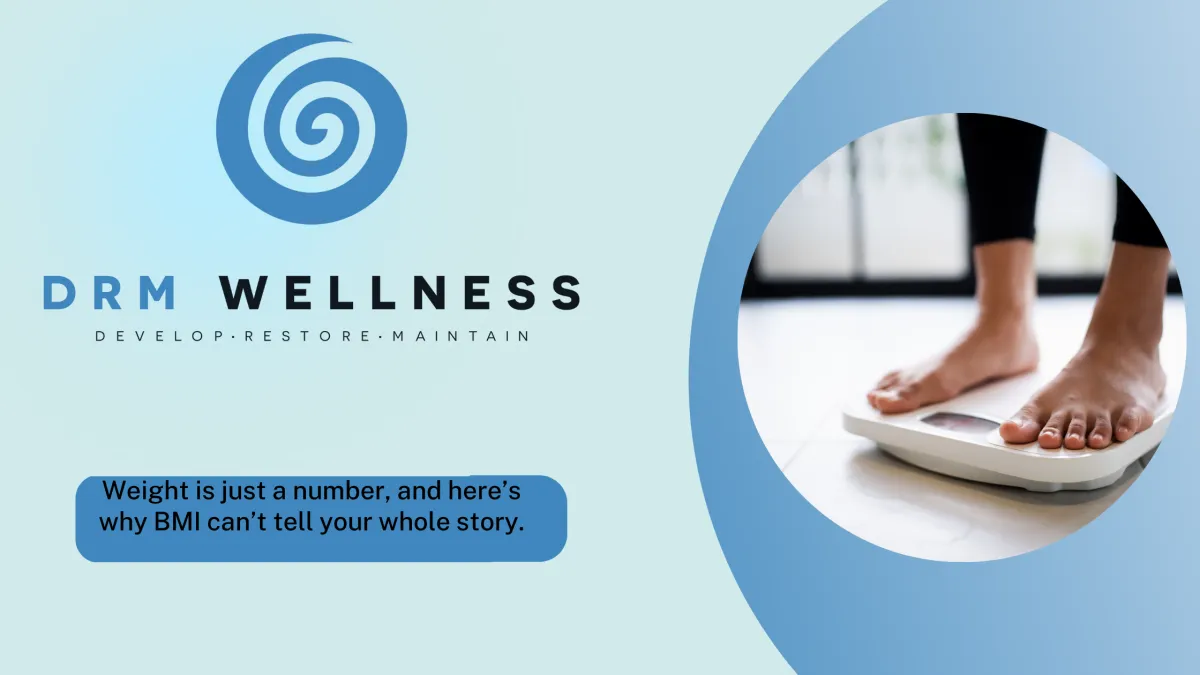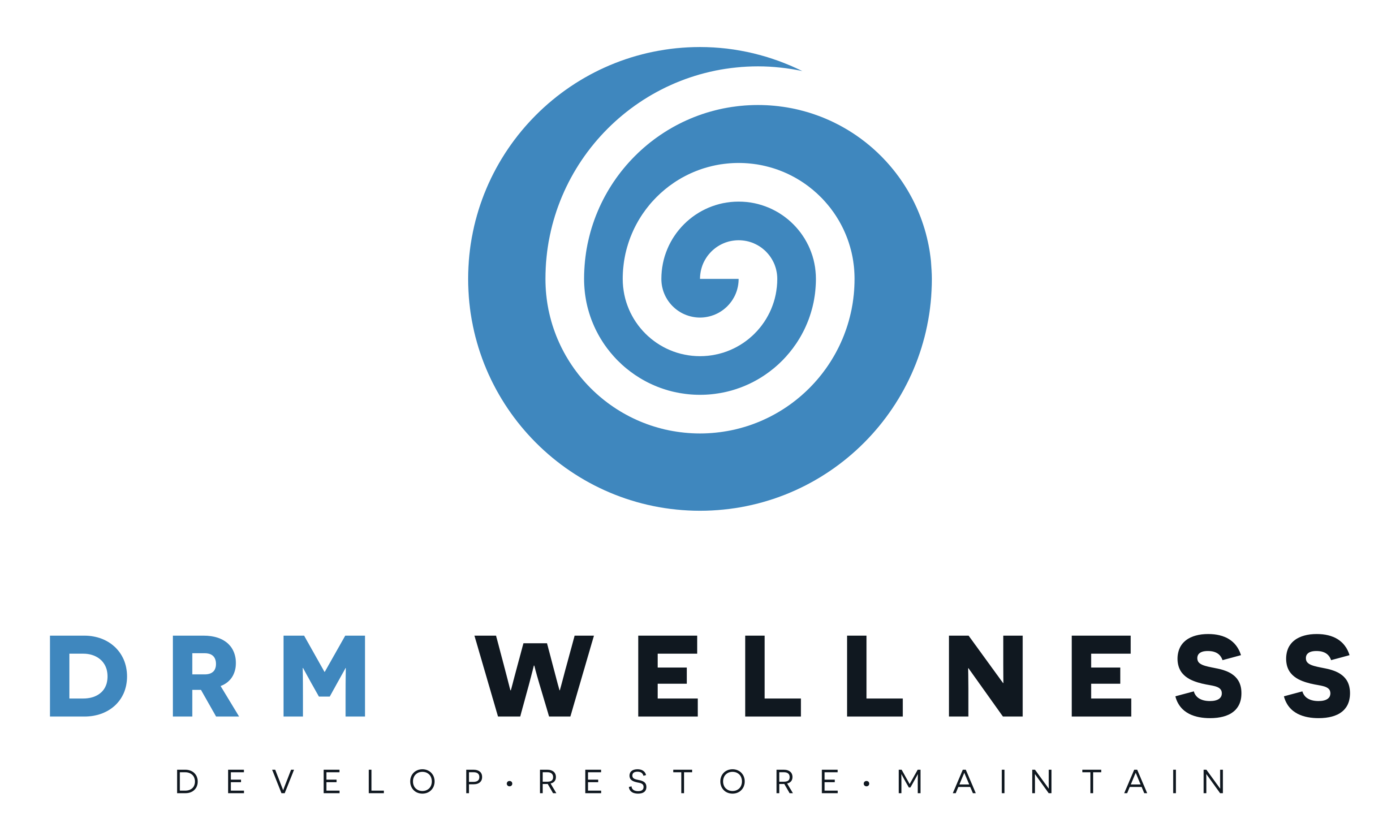Blogs
“When health meets heart, the conversation begins, and it starts here.
Knowledge that empowers. Stories that connect. Support that matters.”
~ DRM Wellness

Weight is just a number, and here’s why BMI can’t tell your whole story
Weight is just a number, and here’s why BMI can’t tell your whole story
What exactly is BMI?
BMI stands for Body Mass Index. It’s a simple calculation of your weight in kilograms divided by your height in meters squared. In other words, it compares your weight to your height, giving a single number. That number is then slotted into categories like "underweight," "normal weight," "overweight," or "obese." These categories were created to quickly estimate who might be at risk of health issues related to body weight.
Why is BMI so commonly used?
BMI became popular because it’s quick, cheap, and easy. Doctors, insurance companies, and health researchers have used it for decades because it only requires a scale and a tape measure. It can also help identify health trends in large groups, like how many people in a population fall into certain weight categories. For public health purposes, it offered a way to flag potential issues.
The problem with BMI: it’s simplistic
The reality is that BMI is overly simplistic. It doesn’t measure what your weight is actually made of. BMI can’t tell if your weight comes from fat, muscle, bone, or fluid. That means two people with the same height and weight will have the same BMI, even if one is a bodybuilder and the other has more body fat and less muscle.
Some examples of why BMI falls short:
Muscular individuals often have a high BMI that classifies them as overweight or obese, even though they have low body fat and excellent health.
Older adults may have a normal BMI but still carry high body fat due to loss of muscle, which puts them at greater health risk.
Different body types and ethnic backgrounds can naturally carry weight differently, leading to inaccurate risk assessments when BMI is the only measure used.
BMI doesn’t show where your fat is located. Visceral fat around your organs carries much more health risk than fat on your hips or thighs, but BMI can’t see that.
What the new research really says about BMI
Article: https://shorturl.at/4DgOW
A new study from the University of Florida, published in Annals of Family Medicine, followed 4,252 adults over 15 years to compare the ability of body fat percentage and Body Mass Index (BMI) to predict future health outcomes.
Their findings were clear:
Body fat percentage is a much better predictor of health risks (like heart disease, stroke, and overall mortality) than BMI.
Many individuals classified as “normal weight” by BMI actually had high body fat percentages, a phenomenon called normal weight obesity, which can hide serious health concerns.
People with higher BMI who had lower body fat percentages didn’t show the same elevated health risks BMI alone would suggest.
BMI misclassified risk in a significant number of people, especially women, older adults, and athletes, due to variations in muscle mass, bone density, and fat distribution.
The Numbers That Speak Volumes
Those with high body fat were 78% more likely to die during the study period than people with healthier body fat levels.
They were also more than three times as likely to die from heart disease, regardless of their BMI
In contrast, being classified as “obese” via BMI showed no significant link to mortality over 15 years.
Why this matters for your wellness journey
For decades, BMI has been treated like a definitive health grade. But this new study highlights why health is not one-size-fits-all:
A BMI over 25 or 30 doesn’t automatically mean you’re unhealthy.
A “normal” BMI doesn’t guarantee you’re in good health.
Context, like your body composition, fitness level, nutrition, stress, and medical history, matters more than a single calculation.
What we believe at DRM Wellness.. we see you, not a number
This is why we say weight is just a number. It is literally just the relationship of your body to gravity. It does not define you! Your BMI should never make you feel shame. At DRM, we look at your overall health, strength, movement, and quality of life. We are a judgment-free zone, where you are supported for who you are today and encouraged to build the healthiest version of yourself without labels or fear.
This is why we believe weight is just one piece of a much bigger puzzle and never a reflection of your worth:
Health is multidimensional. We look beyond that scale, focusing on body composition, energy, strength, emotional wellbeing, sleep and more.
Shame has no seat here. We reject the idea that BMI alone can tell your health story. You aren’t “lazy,” “unhealthy,” or “failing” because of a number somewhere on a chart.
We meet you where you’re at. Every body is unique. We honor your strengths, limitations, and goals and build from there, without judgment or pressure to fit into a weight category.
Strength is our benchmark. Whether that means lifting heavier, sleeping better, or moving with more ease and independence, your journey is about empowerment, not a spot on the BMI scale.
What this all means for you:
BMI can prompt valuable health conversations, but it's not the final word. If it's worrying you, ask your healthcare team for deeper measures like body fat data, waist-to-height ratio, lab results, or functional goals.
Prioritize metrics that reflect living well. Are you stronger, eating better, sleeping better, or more energetic? These wins matter just as much if not more than a numerical label.
Remember your value is unmeasurable. You deserve dignity and support no matter what your BMI says.
In this space, weight holds no power over your self-worth.
That’s why at DRM Wellness, we focus on individualized assessments, not outdated charts. We look at strength, mobility, endurance, mental health, and real-life function, because your worth and your wellness can’t be summed up by a formula created in the 1830s. You're not just a number. You're you. And we're here to cheer you on, every step of the way.
If you’re ready to talk about your health journey and what it really means to feel healthy and move with confidence, call us today. We’d love to help you build strength, improve mobility, and find joy in movement, without judgment or pressure. Let’s work together to develop skills, restore function, and maintain your health and independence. Reach out at (402) 940-8181 or email us at [email protected]. We can’t wait to meet you!

Take The Next Step with DRM Wellness
Testimonials

MEDICAL DISCLAIMER:
All information on this website is intended for instruction and informational purposes only. The authors are not responsible for any harm or injury that may result. Significant injury risk is possible if you do not follow due diligence and seek suitable professional advice about your injury.
No guarantees of specific results are expressly made or implied on this website.
Copyright © 2025 All Rights Reserved by DRM Wellness.



Facebook
Instagram
LinkedIn
Youtube
TikTok